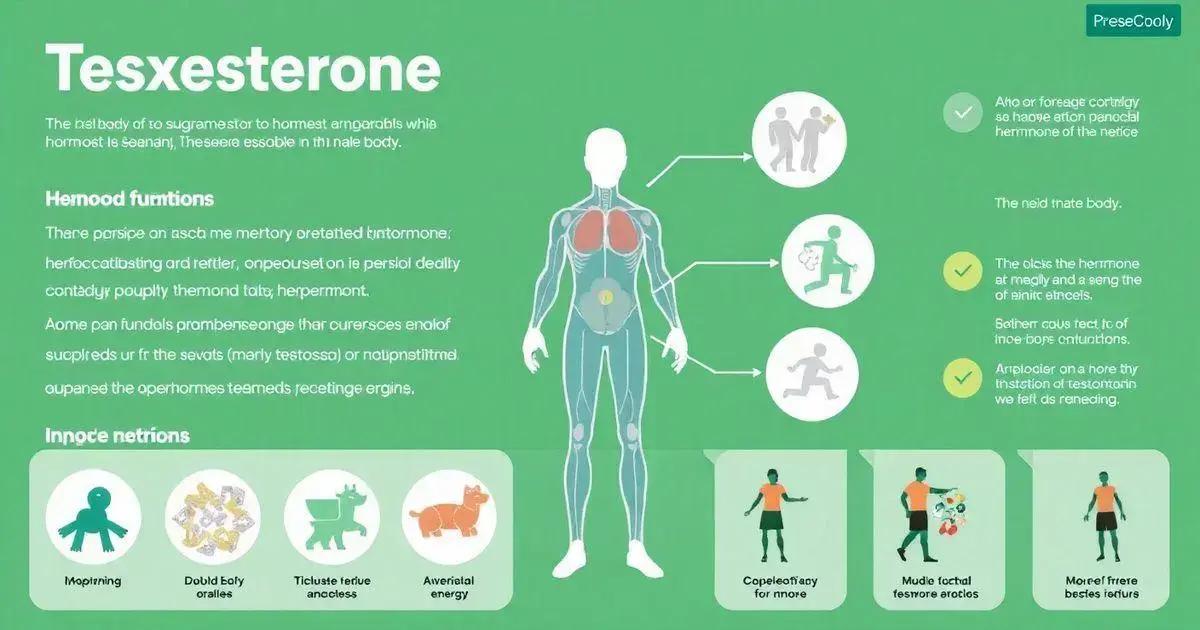Testosterone therapy plays a crucial role in modern men’s health by helping to restore hormone levels, leading to benefits such as increased energy, improved mood, enhanced sexual health, and greater muscle mass, while also requiring careful monitoring of potential risks like cardiovascular issues and prostate health concerns.
The Role of Testosterone Therapy in Modern Men’s Health is becoming increasingly significant as men seek ways to enhance their vitality and overall well-being. Low testosterone levels can lead to a range of health issues, including fatigue, depression, and decreased libido. In this article, we will delve into the functions of testosterone, the benefits it offers, and the potential risks associated with therapy, as well as what’s on the horizon for this important aspect of men’s health.
Understanding Testosterone and Its Functions

Understanding Testosterone and Its Functions is essential for grasping its impact on men’s health. Testosterone is a hormone produced mainly in the testicles and is vital for the development of male physical features. It plays a vital role in various bodily functions.
What is Testosterone?
Testosterone is classified as an androgen, a type of hormone that contributes to masculine traits and reproductive functions. In men, testosterone is responsible for traits such as muscle growth, bone density, and body hair. Additionally, it influences mood, energy levels, and libido.
How Testosterone Works
Testosterone affects many systems in the body. It helps regulate fat distribution, enhances muscle strength, and supports the production of red blood cells. Moreover, it supports the health of reproductive organs and contributes to maintaining general well-being.
Normal Testosterone Levels
Normal testosterone levels fluctuate throughout a man’s life. Levels tend to peak in early adulthood and gradually decline with age. Factors such as stress, diet, and overall health can further influence testosterone levels. Regular check-ups can help monitor these levels effectively.
Signs of Low Testosterone
Symptoms of low testosterone can vary but often include fatigue, reduced sex drive, and emotional changes. Physical signs may comprise decreased muscle mass and increased fat. Identifying these symptoms early on can lead to formulations of appropriate therapy options.
Recognizing the significance of testosterone in modern men’s health is crucial for enhancing quality of life. Understanding its functions empowers men to take proactive steps in maintaining their health.
Benefits of Testosterone Therapy

Benefits of Testosterone Therapy are many and can significantly improve men’s health and overall quality of life. When testosterone levels are restored to normal, many physical and mental health issues can be mitigated.
Improved Energy Levels
One major benefit is increased energy. Men receiving testosterone therapy often report feeling more energetic and less fatigued. This boost can help men engage more in daily activities and improve the quality of their life.
Enhanced Mood and Mental Clarity
Testosterone therapy has also been linked to enhanced mood. Many men experiencing low testosterone suffer from feelings of depression and irritability. Restoring testosterone levels can lead to improved mood, better emotional health, and greater mental clarity.
Increased Muscle Mass and Strength
Another significant benefit is an increase in muscle mass and strength. Testosterone plays a crucial role in muscle development. By undergoing therapy, men can achieve better results from their exercise routines, leading to a healthier and more toned physique.
Better Sexual Health
Testosterone therapy can greatly enhance sexual health. Many men experience decreased libido and sexual difficulties when testosterone levels drop. Therapy can help improve sexual desire, increase the frequency of sexual activity, and enhance overall sexual satisfaction.
Utilizing testosterone therapy can lead to a remarkable improvement in lifestyle and health, empowering men to live more fulfilling and vibrant lives.
Risks and Considerations in Therapy

Risks and Considerations in Therapy are crucial for anyone considering testosterone therapy. While the therapy has many benefits, understanding the potential risks is equally important.
Possible Side Effects
Testosterone therapy can lead to various side effects, including acne, hair loss, and mood swings. Some men may experience increased aggression or anxiety. Anyone considering therapy should discuss these potential side effects with their healthcare provider.
Cardiovascular Risks
There is ongoing debate about the cardiovascular risks associated with testosterone therapy. Some studies suggest that therapy may increase the risk of heart attacks and strokes. It’s crucial for men with pre-existing heart conditions to consult their doctors before starting therapy.
Prostate Health
Another concern relates to prostate health. Testosterone can stimulate the growth of prostate tissue. Men with a history of prostate cancer or benign prostatic hyperplasia (BPH) should be cautious and consult their healthcare providers regarding their risks.
Monitoring Therapy Effectiveness
Regular monitoring is vital during testosterone therapy. Blood tests should be conducted to check testosterone levels and monitor health indicators like prostate-specific antigen (PSA). This helps ensure therapy remains safe and effective.
Being aware of these risks and considerations can empower men to make informed decisions about testosterone therapy and prioritize their health.
Future of Testosterone Therapy in Men’s Health

Future of Testosterone Therapy in Men’s Health looks promising as research and medical practices evolve. With growing awareness of men’s health issues, there are continual advancements in therapy options.
Development of New Treatment Methods
Researchers are exploring various methods to enhance testosterone delivery. This includes more convenient forms like gels, patches, and even implantable pellets. These advancements aim to improve patient compliance and comfort.
Personalized Medicine Approaches
The future of testosterone therapy may also involve personalized medicine. Understanding individual genetic markers could help tailor therapy to match specific healthcare needs. This individualized approach has the potential to maximize benefits and minimize risks.
Broader Acceptance and Awareness
As awareness of testosterone’s role grows, more healthcare providers might embrace testosterone therapy. This can lead to early diagnosis and treatment for men experiencing low levels. Increased education on the subject will also help dispel myths surrounding testosterone therapy.
Integrative Health Approaches
Finally, future treatments may shift towards integrative health practices. Combining testosterone therapy with lifestyle changes, such as nutrition and exercise, could enhance overall wellness. This holistic approach may provide a more effective way to improve men’s health in the long term.
The trajectory of testosterone therapy is exciting. With innovative treatments and approaches on the horizon, men’s health can be positively impacted in the coming years.
Wrapping Up the Role of Testosterone Therapy in Men’s Health
Testosterone therapy is becoming an essential aspect of modern men’s health, offering numerous benefits such as improved energy, mood, and sexual health. However, it is crucial to understand the associated risks and considerations to ensure safe and effective treatment.
As we look to the future, developments in treatment methods, personalized medicine, and integrative health approaches promise to enhance the effectiveness of testosterone therapy. This evolution in men’s health will likely lead to broader acceptance and awareness of the importance of maintaining healthy testosterone levels.
Overall, proactive management of testosterone levels can empower men to lead healthier, more fulfilling lives, making it an increasingly important topic in contemporary healthcare discussions.
FAQ – Frequently Asked Questions about Testosterone Therapy
What is testosterone therapy?
Testosterone therapy is a medical treatment that aims to restore testosterone levels in men who have low levels due to age or health conditions.
What are the benefits of testosterone therapy?
Benefits include improved energy, mood enhancement, increased muscle mass, and better sexual health.
Are there any risks associated with testosterone therapy?
Yes, potential risks include cardiovascular issues, prostate health concerns, and side effects like acne and mood swings.
How is testosterone therapy administered?
Testosterone can be administered through injections, patches, gels, or pellets that are implanted under the skin.
Can testosterone therapy improve my quality of life?
Many men report improved quality of life after starting testosterone therapy, including higher energy levels and better emotional health.
How often should testosterone levels be monitored during therapy?
Regular monitoring is crucial; typically, testosterone levels should be checked every 3 to 6 months to ensure therapy is effective and safe.













